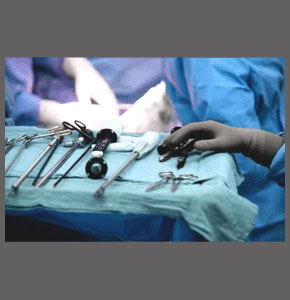
Did you recently have a surgical consultation for spinal stenosis or are planning on having one? We know that surgical consults can be very scary and intimidating. We also know that many readers are conflicted about spinal surgery and even if set on the idea, are often confused by their many procedural options. Spinal stenosis is one of the back pain conditions that responds most favorably to surgical intervention. Statistics clearly show that surgical intervention is often a good bet for stenosis patients, since it provides benefits that can not be met by conservative care methods. However, surgery always has significant downsides and risks to consider and these can make the decision to undergo an operation a very difficult choice.
This essay provides guidance on surgical consultations for spinal canal stenosis. We will provide an overview of the process, warning signs to look out for and questions that are important to ask your physician before making up your mind.
Surgical Consultation for Spinal Stenosis Overview
Surgical consults are most often made after a referral from a primary care physician or a specialist who is not a surgeon, such as a general orthopedist or neurologist. The simple act of referring a patient to a surgeon is known to produce a serious nocebo effect, since it is implied that the current doctors feels that surgery might be needed. However, this is not factual and is the exact reason why the patient is being referred to a surgical specialist for evaluation. Therefore, never assume that you require surgery or will benefit from surgery before actually talking to a surgeon.
Typically, patients will already have diagnostic imaging studies available for the surgeon to review. If not, then these tests will probably be ordered prior to the consultation. The best form of diagnostic imaging for any type of spinal stenosis is MRI evaluation. If only x-rays are available, be sure to ask the surgeon’s office if these are sufficient. If they say yes, then it might be a good idea to reconsider your choice of doctor, since x-rays leave many variables in what the surgeon will find once the operation has already begun.
Surgical Consultation Cautions
On the subject of choosing a doctor, there are many warning signs to look out for. Below, we list some considerations that might make you think twice about choosing a particular surgical care provider:
The surgeon should perform a full physical exam on you. If they merely review diagnostic imaging studies then advise you on whether or not surgery is indicated, they are not a good choice of doctor.
The surgeon should spend a reasonable amount of time with you. If they are in and out of the room in five minutes or less, making a judgment that could potentially alter your future drastically, then they are best cast aside.
If money or insurance coverage is the main focus on the conversation, simply leave. This is completely unprofessional behavior for any surgeon or their staff at such an early stage.
If anything about the doctor bothers you, be it their demeanor, pushiness or general “bedside manner”, pass them up and find someone who speaks to you in your heart and mind.
Surgical Consultation for Spinal Stenosis Questions
Here are some very important questions for your surgeon. We list these queries since many patients are not sure what to ask or forget under the strain of a heated moment due to nervousness. Make sure that the doctor can easily and thoroughly answer these inquiries or they might not be the best suited to perform surgery on your one and only body:
If surgery is recommended:
What type of procedure do you recommend and why? What are my other options?
What is my prognosis from your recommended procedure?
What are the risks?
How long is the recovery time and what will I feel like once my body heals?
Should I seek a second opinion?
If surgery is not recommended:
Why do you think that I do not need surgery? What is my prognosis without it?
Should I seek a second opinion?
Make sure that the doctor can address your concerns in a manner that makes sense to you. Please notice that we include the question about a second opinion in both scenarios where surgery is recommended and not recommended. This is an important question, since it tells a lot about the surgeon’s character and motivations. If they truly have your best health in mind, they will want you to seek another opinion to ensure your safety and satisfaction with whatever treatment path you select. If they are more concerned with keeping you as a customer, then you will know by their answer. Remember, even surgeons who say that surgery is not needed often have nonsurgical treatments available also…
Spinal Stenosis > Spinal Stenosis Surgery > Surgical Consultation for Spinal Stenosis





